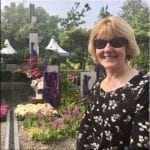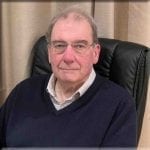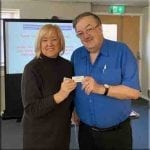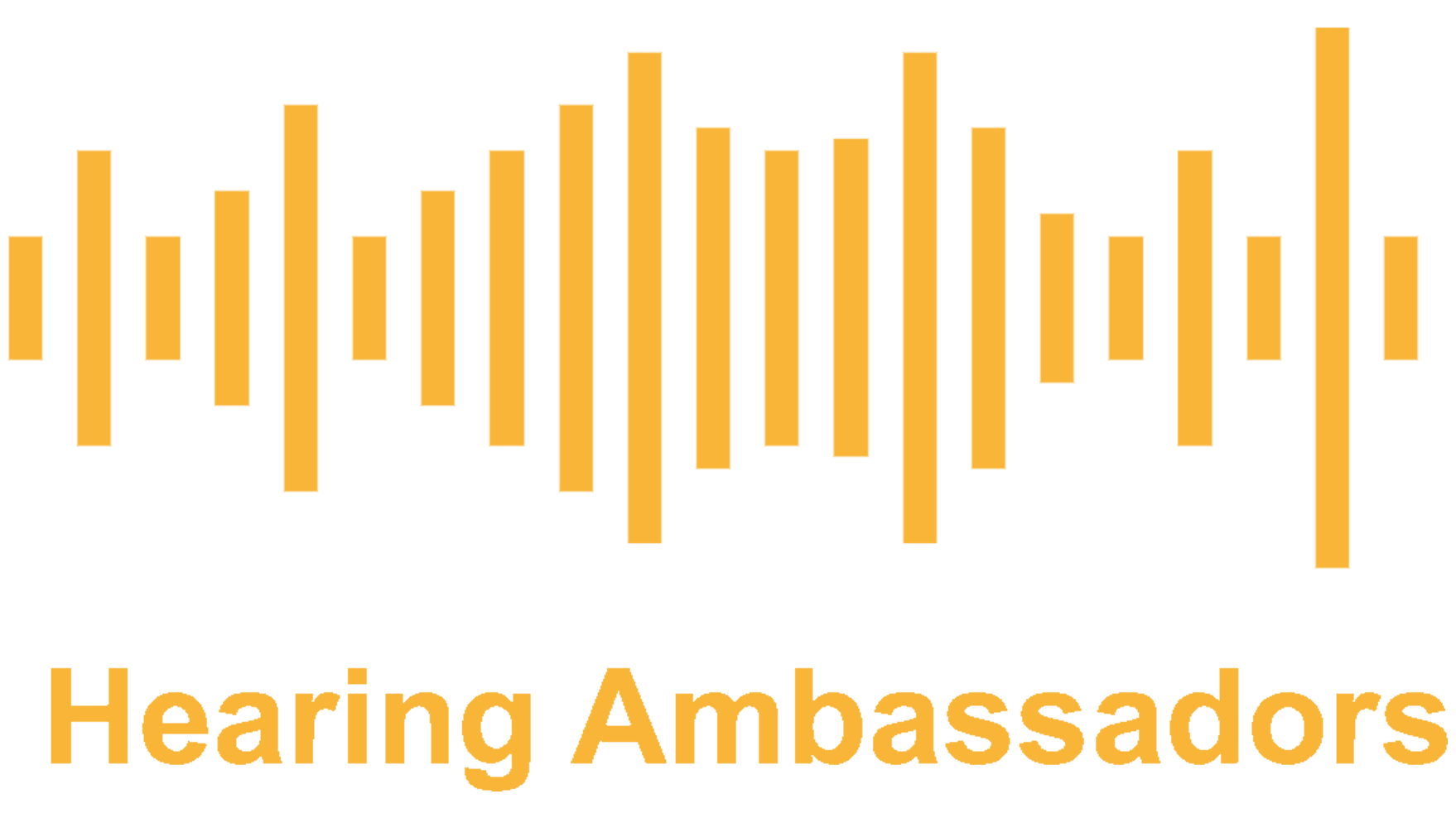John’s Story
 I have had tinnitus for several years.
I have had tinnitus for several years.
It is a white noise which was gradually getting worse. Visits to restaurants were becoming difficult as the current fashion for hard floors, hard walls and hard tables means that every sound is reflected. It meant that I was finding communication difficult in public places. I just couldn’t hear what was going on. I assumed that this was due to my tinnitus.
Eventually, I was cajoled by my wife to go to the doctor who instantly referred me to the audiology clinic at Chesterfield Royal Hospital. After a wait of about three weeks, I went to the clinic and had my hearing test, which was interesting in itself, trying to make out sounds at different pitches in one ear or the other, and through bone conduction. I emerged from the listening booth to see the results which basically showed my hearing levels falling off a cliff at higher frequencies.
I was also told that the tinnitus was not the cause of my inability to hear things, but it was caused by my deafness, as the brain attempted to compensate for its inability to hear higher-pitched sounds. The lovely audiologist went to a cupboard came out with 2 hearing aids which she fitted to earpieces to suit me and connected them to the computer to match them with my hearing loss.
My first reaction to having them fitted was amazement – everything was so loud – and the tinnitus had gone! I was absolutely ecstatic. Off we went, and as we left the hospital, I could hear the birds singing – and I had assumed that there weren’t any birds singing. That was the first remarkable thought – when you are deaf you don’t realise what you can’t hear, and the lack of clarity of communication means that people with hearing loss become self-excluding from social interaction. Not good news as this had already led me to some isolation – being from Yorkshire, I couldn’t see the point in spending money to not enjoy myself – and so I had begun to avoid social situations.
The second thing, which I had been warned about was how much I could hear, as the hearing aids pick up everything, and it takes a while for the brain to retrain itself to filter out extraneous noise – and apparently, this is harder to do the older you are. It is not always successful for me even now. Finally, I started to use the Induction Loop* at the theatre and I love it – the clarity of sound and the lack of noise from fellow-theatregoers is wonderful. It’s like having the best seats in the house – every time.
*See the downloadable brochure in Resources for more information about assistive technology and how to use the Hearing (Induction) Loop for both hearing aid wearers and frontline teams.
Geraldine’s Story
I can now.
 The last words I heard from the NHS facilitator were “perseverance” and “I am sure you will cope admirably”.
The last words I heard from the NHS facilitator were “perseverance” and “I am sure you will cope admirably”.
What wasn’t quite so clear was for how long and how awkward you feel when first getting used to the new ‘body parts’. I am now so grateful for that advice as initially I couldn’t see myself ever just popping the hearing aids in and dashing off to whatever was on the calendar but I can now – most of the time!
I couldn’t see myself wearing them on the golf course – but I do now and they only come loose occasionally! Who worries about the wind whistling past them diminishing their effectiveness a little? At least I can hear the comforting comments when my golf shot goes where it shouldn’t.
I didn’t think my spectacles would ever sit comfortably on-top/around the aids but they do now.
I also worried about whether I would know when the batteries would run out and would I recall what the various bleeps meant what. It soon just happens and I always keep spares with me. How would I know where to get replacement batteries and would they really just give them to me. Naturally that was easy plus annual replacement extras were given too. How on earth would I remember how to poke the piece of plastic through the system to increase their efficiency having just been shown once? Practice of course.
So perseverance has paid off and I can now hear initial sounds, words and sentences and not look quite so vacant when a conversation is begun without my name being called first.
I can pick up parts of conversations across the table which means being included in group chats. I don’t just nod across the table hoping I am not nodding agreement to something I disagree with! And now, I don’t even know I have them in.
Yes, it took time and I struggled to get the hearing aids in my ears, yes I still don’t always hear quite what is being said especially in a noisy environment and yes, many noises still seem exaggerated and ‘out of kilter’; especially rustling bags etc. but perseverance has helped to alleviate these and the hearing is worth it. I do recall though the first time I heard the microwave beep. I thought an alarm had gone off!
Andrew’s story
 Andrew’s hearing loss came on suddenly overnight and like many other people in his situation, he generally tries to avoid large meetings, not because he doesn’t have a contribution to make but because he simply can’t hear, which is immensely frustrating for him. Take a fast-moving meeting in a poorly lit room with a tiled floor and the incessant hum of an air conditioning unit or background music and it’s a recipe for disaster. Andrew was attending a meeting about how his organisation works to serve its local community. He struggled to understand the discussion about Dementia and isolation and what cafes might have to do with his organisation. Inevitably, when he realised that he could not make out what was going on, he mentally withdrew from the situation, nodding and smiling at what he felt were appropriate points. He totally missed the discussion about isolation.
Andrew’s hearing loss came on suddenly overnight and like many other people in his situation, he generally tries to avoid large meetings, not because he doesn’t have a contribution to make but because he simply can’t hear, which is immensely frustrating for him. Take a fast-moving meeting in a poorly lit room with a tiled floor and the incessant hum of an air conditioning unit or background music and it’s a recipe for disaster. Andrew was attending a meeting about how his organisation works to serve its local community. He struggled to understand the discussion about Dementia and isolation and what cafes might have to do with his organisation. Inevitably, when he realised that he could not make out what was going on, he mentally withdrew from the situation, nodding and smiling at what he felt were appropriate points. He totally missed the discussion about isolation.
The meeting moved on to the second topic, hearing loss in the community.
“Andrew, Andrew”, someone said “You have Hearing Loss. Tell us about your experiences and if the T-Loop works”.
It took a couple of strategically placed prods for him to regain consciousness and realise that people wanted to know about his experience, but by then the pent-up frustration got the better of him and he explained to the group that in his experience, a person with hearing loss can feel left out and alone even in a group situation, even when everyone in the group has kind and inclusive intentions.
In the flash of a light bulb, the group suddenly realised that Andrew had been totally isolated from the meeting due to his hearing loss and, as we subsequently discovered, he was not alone. One by one the others started to explain that they couldn’t hear or follow the conversation very well either.
Hearing loss can come on suddenly or develop slowly over a lifetime. Regardless of how it develops, the effects are just the same. Many people don’t acknowledge that their hearing is not so good and this is likely to be a contributing factor to their decision to avoid social situations because they are simply unable to hear and hence understand or take part in what is going on.
So, on 1 November 2017, this group of friends, led by Dr Cheryle Berry decided that they should do something about it and Hearing Ambassadors was born.
Rosie’s Story
Do you know how it feels to hear half of a conversation? To never have the full story? How are you supposed to join in, share your ideas and make yourself heard?
 My name is Rosie and I have been a Rotarian since early 2018, when I joined with my husband Robert.
My name is Rosie and I have been a Rotarian since early 2018, when I joined with my husband Robert.
In general, most people would agree that I am an outgoing and confident person. However, each Monday lunchtime at our Rotary meetings, I insisted that Robert sat beside me. Why? I felt embarrassed because I knew I would not hear most of what was being said at our table, or at the meeting itself. Therefore, it was difficult for me to take part in conversations with confidence. I needed Robert there to repeat or discreetly let me know what was being discussed. Because of this, 3 months in, I really did not think that Rotary was going to be for me. However, we had booked and paid to go to the District Conference at Scarborough in October 2018, so I decided to ‘stick it out’!
At the conference, I met Gill and Andrew Campbell at their Hearing Ambassador stand, and I found it emotional to meet someone who understood the challenges I had been facing. Their commitment to expanding Hearing Ambassadors inspired me, and I was encouraged to be part of their efforts to promote hearing awareness on a much larger scale.
Following our conversation, I invited Gill and Andrew to come to a Club meeting as Guest Speakers. I will always remember this day because they enabled me to stand up with confidence and make my Fellow Rotarians aware of how my hearing loss had often made it a struggle for me to join in. I asked my fellow members for their support in introducing measures to make our club more hearing-friendly.
I became Hearing Ambassador for our Rotary Club, and we all worked together to make the necessary changes to our room setting, sound system and our actions. We now ensure that everyone at our meetings can hear and be heard. I am very proud of my fellow Rotarians, who never let these small changes slide, and whose involvement and on-going support is to be highly commended.
Now, as a Member of the Hearing Ambassador Steering Group, I produce and present training workshops, which enable others to become Hearing Ambassadors. Our workshops create empathy and give participants the knowledge and tools that they need to implement changes in their Rotary Clubs, thereby promoting Hearing Awareness.
Derek’s Story
 I was a competitive (and successful) shooter from the age of 14, starting with small-bore rifle (.22) in indoor ranges and later graduating to full bore (.303) outdoors. In 1956 hearing protection was unheard of on rifle ranges, so my ears were subjected to a lot of loud noises. The sound level of a small-bore rifle is in the region of 140 dB and full bore around 170 dB. Practice sessions usually involved each shooter firing 100 to 120 rounds and there were normally four people firing.
I was a competitive (and successful) shooter from the age of 14, starting with small-bore rifle (.22) in indoor ranges and later graduating to full bore (.303) outdoors. In 1956 hearing protection was unheard of on rifle ranges, so my ears were subjected to a lot of loud noises. The sound level of a small-bore rifle is in the region of 140 dB and full bore around 170 dB. Practice sessions usually involved each shooter firing 100 to 120 rounds and there were normally four people firing.
In my mid-30s, I frequently suffered from tinnitus, a condition that still affects me today but to a much lesser extent, as it is generally masked by my hearing aids.
During a visit to Derby Royal Infirmary for ear syringing, I was asked if I would like a hearing test. I accepted this offer, was told that I had high-frequency hearing loss and was prescribed a pair of digital hearing aids.
Two weeks later, on the 8th of March 2007, my ear molds were ready and I was fitted with my ‘lectro-lugs’. The first thing that I noticed was the noise level in my car. I had thought that it was quite quiet up until then. I was sadly disillusioned! Early the next morning I heard birdsong for the first time in many years. I had not realised that this beautiful sound had been missing for a long time; it must have gradually faded away.
Listening to classical music, opera and jazz has been an important part of my life, both live and through a high quality hi-fi system. Surprisingly, I did not notice an enormous difference in the sound at first. I think that because I was very familiar with all the recordings in my collection, my brain was filling in the sounds that I could not hear. What I did notice, and it backs up this theory, is that when my wife, a professional pianist, played her piano, not only could I hear all but the three top notes (these did not feature in any recordings that we had) I could also hear the sound of the hammers hitting the strings!
The most important job that hearing aids should do, is aid one’s interpretation of speech. I had been aware since the beginning of the century, that I was finding it harder to understand what people were saying, especially in groups and in noisy environments. The hearing aids helped but were not perfect. As time went on, I was given more advanced aids from and switched to ‘slim fit’ eartubes, which were much more comfortable than the older style molds. However, speech discrimination was still a problem.
In 2014 or 2015, I saw a flyer from the Adult Education Centre in Long Eaton, which mentioned lipreading classes. Cutting a long story short, I am now in my 5th (I think) year of studying this craft. Our class usually has a dozen students, we have a tremendous sense of community as we all have similar problems. We are taught by an inspired and inspirational teacher. We always have fun and we learn a lot. However, only 40% of English can be read from the lips. Knowing the context of the conversation is an enormous help.
As far as Rotary is concerned, I almost left the club at one point. We had left our old home due to a change of ownership. For a while, we met at a hotel, where the acoustics were so bad that I normally left a meeting with very little idea of what had transpired! Fortunately, we moved to our current location which though far from perfect, is much better and I usually hear at least 85% of what is said at meetings.
Please click here to back to the main ‘Stories’ menu to see the other categories of stories.
